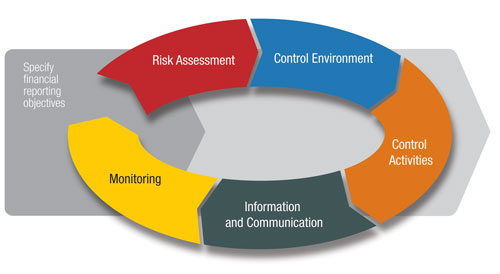One small but critically important sub-category of chemical incidents consists of those that can produce mass casualties, usually when a cloud of toxic or superheated gases are spewed out by a fire or explosion. Given America’s fragmented approach to hazardous materials regulation, it’s no surprise that separate regulatory programs have grown up to address these concerns—leading inevitably to overlaps and gaps in coverage.
Audit, Compliance and Risk Blog
Tags: Corporate Governance, Business & Legal, Health & Safety, OSHA, Environmental risks, Environmental, EHS, EPA, Greenhouse Gas, Hazcom
Free Webinar: GRI G4 Materiality Aligns Sustainability Reporting and Strategy
Posted by Melanie Powers on Mon, Aug 19, 2013
Tags: Corporate Governance, Business & Legal, Training, Environmental, Webinar
On May 14, 2013, the Committee of Sponsoring Organizations of the Treadway Commission (COSO) issued its final revised “Framework” for internal control reporting. Many accountants and other readers may raise the question, who is COSO and what do they do? Yes, accountants are quite familiar with guidance issued by the Financial Accounting Standards Board (FASB), the Securities and Exchange Commission (SEC), and other standard-setters, but COSO is not a standard-setter. So, this latest version of the COSO Framework arguably is a “sleeper” when it comes to guidance that may affect accountants.
Tags: Corporate Governance, Business & Legal, SEC, Accounting & Tax, Lease Accounting, Audit Standards, Accountants
EPA Excludes Solvent-Contaminated Wipes From RCRA Regulation
Posted by Jon Elliott on Wed, Aug 14, 2013
Tags: Business & Legal, Employer Best Practices, Health & Safety, Environmental risks, Environmental, EHS, EPA, RCRA
Recent Changes to Disclosure Requirements for SEC Registrants
Posted by STP Editorial Team on Tue, Aug 13, 2013
Actions by the SEC, other federal agencies and the courts continue to change or propose changes to the rules concerning the disclosures that publicly listed companies must make. They are responding to the latest series of U.S. federal laws aimed at improving corporate accountability and enhancing growth in a slow economy. Most recently, a court has vacated the SEC rule on disclosure of payments by resource extraction issuers, and the U.S. Government Accountability Office (GAO) has recommended further disclosures about auditor attestation, as follows:
Tags: Corporate Governance, Business & Legal, SEC, Audit Standards
If government provided a unified approach to chemical regulation, then each chemical might be subject to a single set of requirements, which ideally would be tailored to reflect chemical-specific hazards throughout its life cycle. Instead, each chemical is subject to its own loosely connected (some would say haphazard) collection of environmental, health and safety (EH&S) requirements. Some are federal, some are state (or provincial if you’re in Canada), and others are regional and even local. You may need to refer to agencies at all three levels (federal, state and local) to identify your regulators and their requirements – although many organizations only deal with the agency responsible for permitting and inspecting day-to-day activities.
Tags: Audit Standards, Environmental risks, Environmental, EHS, EPA, Hazcom, MSDS, mact
Over the past several decades, the construction industry has moved to an airtight standard for new buildings in order to reduce heating and cooling costs. In such dwellings, however, where moisture gets in, it is less likely to air-dry. The resulting damp conditions create the perfect environment for mold growth.
Tags: Corporate Governance, Business & Legal, Insurance, Insurance Claims
Reconsidering “Accredited Investors” and How They’re Protected
Posted by Jon Elliott on Mon, Jul 29, 2013
The Securities and Exchange Commission (SEC) was created 80 years ago to protect investors, while also nurturing the growth of efficient and transparent markets for securities. Over the intervening years, the balance between protection and growth has shifted many times, leading to many sets of requirements with conditions and exemptions to parse in order to determine entrepreneurs’ notice and filing requirements, and the range of investor opportunities and protections.
Tags: Corporate Governance, Business & Legal, SEC
Will Proposed New Insurance Contract Accounting Rules Apply to You?
Posted by Ron Pippin on Thu, Jul 25, 2013
Companies and users of financial statements should be alert to the potentially far-reaching consequences of a June 27, 2013, proposal issued by the U.S. Financial Accounting Standards Board (FASB). If adopted, the proposal would likely change how certain companies that provide insurance (not policyholders) account for insurance contracts. Maybe most importantly, the proposal would affect financial accounting by many companies that don’t consider themselves an “insurance company.” Financial institutions, including banks, are just one example. Undoubtedly, the scope of this proposal will surprise many—possibly even the FASB. This proposal, titled Insurance Contracts (Topic 834), is a whopping 405 pages in length—not exactly light reading!
Tags: Corporate Governance, Business & Legal, Accounting & Tax, Audit Standards, Accountants, US GAAP, GAAP, Insurance
Court Vacates SEC’s Resource Extractors’ Reporting Requirements
Posted by Jon Elliott on Fri, Jul 19, 2013
One of the Dodd-Frank Act’s many directives to the Securities and Exchange Commission (SEC) was to require annual disclosures by publicly listed “resource extraction issuers” of payments they make to the U.S. federal government or foreign governments, related to commercial development of oil, natural gas, or minerals. SEC thought it met this directive when it issued Rule 13q-1 and associated Form SD in August 2012. However, on July 2, 2013 a federal judge decided that SEC misapplied its authority, and so vacated these provisions and remanded the issue to SEC to try again (American Petroleum Institute v. SEC). Since Dodd-Frank required issuer reporting to begin no less than one year after SEC issued rules, the issuer reporting requirement is now on hold—but the statutory requirement remains in place so further rulemaking should be expected.
Tags: Corporate Governance, Business & Legal, SEC, International, Health & Safety, Environmental, Greenhouse Gas, ghg, fracking, hydraulic fracking

.jpg)








